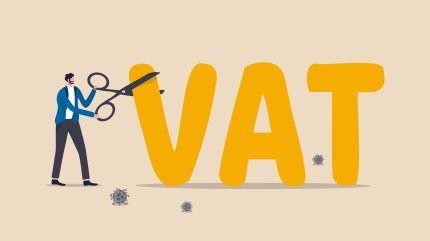
At a time when companies are managing more expensive clinical trials with less funding, any opportunity to reduce trial costs is vital to keep small and medium biotechs on their feet.
For companies that operate from outside the European Union (EU), many are not aware that there are ways to recuperate some cash spent to run trials. Value-added tax (VAT) is automatically added to all imports into the EU and can account for thousands of dollars, with many companies not aware of this extra charge until their product has landed on EU soil. However, due to a particular directive, VAT can be recoverable for certain companies.

Discover B2B Marketing That Performs
Combine business intelligence and editorial excellence to reach engaged professionals across 36 leading media platforms.

Dale Bushell, director of Pharmaceuticals and Aviation at tax assistance firm VAT IT, spoke exclusively to the Clinical Trials Arena about how companies can go about recovering these costs and how this can be of great assistance to keep a company afloat at a time when many small and medium-sized biotechs are facing financial difficulties.
Abigail Beaney (AB): Could you explain how the process works – what can companies do to recover VAT?
Dale Bushell (DB): The European Union (EU) is like one country in terms of customs and borders. As a result, companies based in the US, UK and APAC that are conducting clinical trials that require them to move goods into Europe all pay VAT on their imports as soon as their goods hit EU soil.
That tax will be charged immediately on the value of the goods going through customs and is a percentage of the value of the goods – in Germany, for example, that is 19%. In cell and gene therapies or oncology, those products or vials can be very high value – let’s say it is worth €100,000 ($103,000), a sponsor is going to be paying €19,000 on top of that, but that €19,000 is fully recoverable for businesses who are based outside of the EU. The company does not need a physical presence in the EU to recover that cost due to the 13th directive legislation. This legislation that the EU released back in 1986 says if a company is doing business and bringing economic growth to the EU, the EU will reward that business by allowing it to redeem that tax.
Most companies do not know about this opportunity but instead believe it is a sunk cost. A big issue we are seeing in the clinical trial space, especially with small and medium-sized biotechs, is that companies have not accounted for that initial payment when their goods enter the EU. Companies will be contacted by the shipping company or CDMO that informs them of the initial payment owed, but it is not broken down to let these companies know what is redeemable. Companies will then search for those costs and the VAT is usually bundled in with other taxes and import costs.

US Tariffs are shifting - will you react or anticipate?
Don’t let policy changes catch you off guard. Stay proactive with real-time data and expert analysis.
By GlobalDataA sponsor or biotech then also encounters other costs incurred by a CRO or other outsourced services, whether that be getting supplies, ancillary supplies, or translation fees. Those costs are normally charged back to the customer, but these costs are again not broken down into what could be redeemable.
Any redeemable costs tend to be hidden in the underlying invoices – these include translation costs and travel costs where VAT on these is redeemable. Sometimes the CRO is charging that VAT back to the sponsor or biotech instead of recovering it. Many smaller companies would not realise this is happening or that they can redeem those costs.
It extends even further again if a staff member is travelling for trade shows and events – hotels, meals and drinks will all include VAT tax that is also fully recoverable.
The span of that recovery is huge, and many people do not know that. Of course, the biggest ticket item is always going to be the import of goods or comparative purchases, but it does trickle down to smaller items. This accumulated over 12 months could end up being thousands of Euros – in some cases, we have seen it be millions of Euros in additional costs that companies never realised were redeemable.
AB: How important can this recovery be for a small or medium biotech financially at a time when investment is at a low?
DB: It is extremely important because it is an upfront cost and VAT is going to be charged like VAT in the UK or sales tax in the US. It is an important thing to consider when you are looking to run international trials. We have seen it with customers who do not understand what VAT is and how it is redeemed. When we show these companies, the executives’ eyes light up as they see an instantaneous cash return – we can look at shipments and see $80,000 sitting there. It also assists in planning, when sponsors realise there are several shipments coming up over the next 12 months on the forecast. When we know what countries, sponsors are shipping to we can immediately estimate based on the value of their products what they can claim back.
That money can go immediately back into the clinical trials, back to patients or back to investors. Whatever they use it for, it is money back into the business and after Covid-19, everyone realised that when in a situation where the company is strapped for cash, this is probably one of the easiest and best ways to get money back into the business.
AB: Could there be any reason why companies may not be eligible?
DB: You have to look at who is paying. If you have a company that is based in the US but they have a French entity, it is vital to know who is paying for the movement of goods. If it is the US business and the French business has no involvement, they can be reimbursed. It all comes down to which entity is paying the VAT.
There is a piece of legislation called Reciprocity, which is the agreement between countries that allows one another to recover the VAT. As there is no VAT system here in the US, this means that US businesses have a lot less reciprocity (countries to recover from) against countries that do have a VAT system such as the UK or Europe.
AB: For companies reading this that did not know these costs were recoverable, would you recommend their first steps to be for them to get that back?
DB: The first thing is to always quantify it – if you have shipped goods into the EU, ask your shipper, CDMO or your CRO for the entry acceptance document (EAD). This is a standard document that breaks down what was charged based on the value of the goods. The documents will be in the native language of the country you imported to but look for codes B00 (VAT on the goods item) and B05 (VAT on the EU/NIP duties). Each country has its own setup, but you can easily find what percentage is taxed.
If you have outsourcing costs and you are getting those Excel reports, ask those underlying invoices to see if there are translation fees or other costs with VAT being charged. You need to ask the outsourcing company whether they recovered those costs or whether it needs to be done. I would also advise, if you do not have much knowledge of this not to try and do it on your own. The reason I say that is it requires a lot of time and effort to learn the laws and legislations of every country and you also have to manage it in that country’s language.
I would reach out to a tax professional or a VAT recovery firm or maybe even your CDMO as some may assist with this, but I would not overlook it – that’s for sure!





